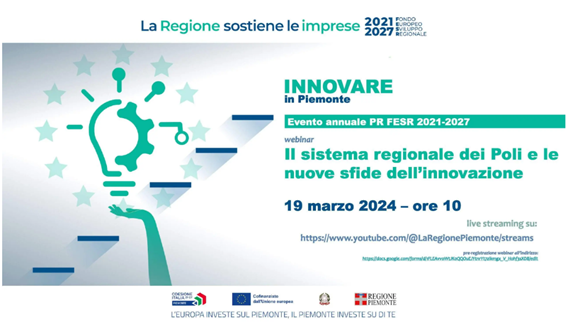Regional cluster ecosystem innovation challenges in Piedmont
On Tuesday the 19th of March, the Piedmont Region hosted the conference The regional cluster system and the new innovation challenges for its annual event on the European Regional Development Fund Regional Programme 2021-2027. The event has been a great opportunity to discuss about the evolution of the regional cluster model of the Region with a peculiar focus on the challenges the system has to face projecting into the future. Not only the digital transition is the centre of attention but also the green transition and the well-being of people and communities: these are in fact the three strategic axes of the new Smart Specialisation Strategy (S3) of the Piedmont Region.
The event opened with the institutional greetings from the Councillor for Innovation and Research Andrea Marnati, the Secretary General of Unioncamere Piemonte Paolo Bertolino, and the representative of three major academic institutions: Luisa Torri, Rector's Delegate for Research of the University of Gastronomic Sciences; Giuliana Mattiazzo, Vice-Rector for Technology Transfer of the Polytechnic of Turin; Cristina Prandi, Vice-Rector for Research of the University of Turin. The Councillor for Innovation and Research recalled the peculiarity of the regional cluster system, the first of its kind in Italy, highlighting the desire to go further together.
Davide Damosso, Chief Operating Officer of the Environment Park of Turin, provided insights into the evolution of the regional cluster model in Piedmont. Originating in 2009 with 12 innovation clusters, subsequent structural reorganization streamlined the number to 7. These 7 clusters later converged into the current Cluster System (Sistema Poli Piemonte) in 2022, forming what is termed a "cluster of clusters". The primary objective of this new policy and structure is to foster horizontal cooperation across diverse domains and technological fields. While vertical specialization remains a central focus of individual clusters, the significance of cross-fertilization and collaboration to drive innovation forward is properly acknowledged.
The day proceeded with a panel discussion entitled The new challenges for the future: ecological transition, digital transformation, well-being and community moderated by Paola Fontana, R&D & Innovation Manager of Città Studi Biella. The panel involved representatives from six companies affiliated with at least one cluster, who showcased their recent innovative projects. The roundtable discussion underlined the pivotal role of clusters in facilitating such innovative endeavors, from conception to subsequent development. Particularly, the stakeholders underlined the strategic role of the cluster in enabling the development of previously absent skills, as well as the establishment of specialised partnerships. Central to this narrative is once again the exchange of knowledge and expertise, not only nurturing innovative solutions but also expediting their implementation.
The event concluded with a speech of Giovanni Amateis - Head of the University System, Right to Study, Research and Innovation Sector of the Piedmont Region – who presented the future calls of the ERDF PR 2021-2027 to support the innovation system in Piedmont.
The registration of the event is availbale on the Youtube channel of the Piedmont Region: https://www.youtube.com/@LaRegionePiemonte/streams

